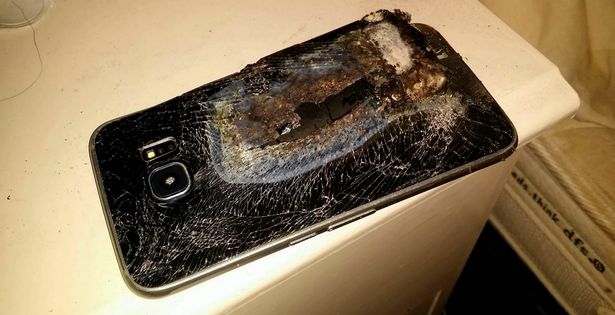Samsung electronics has recently fallen under heavy criticism due to exploding batteries in their defective Galaxy Note 7 products. Before they issued a much-warranted 2.5 million unit recall, there were “35 reported incidents of overheating smartphones worldwide,” with one explosion in a young boys hand (Hollister, 2016). Even since this recall, the number of known explosive devices has risen to 140.

How does this affect where people that are still keeping their phones can go? Definitely not airplanes. A southwestern airlines flight was evacuated 10 minutes before it was set to take off as a phone began to smoke up the entire cabin. As of October 15th, Transport Canada and the U.S. Department of Transportation have announced that these phones will not be allowed to be carried on board, shipped as cargo, or in checked bags regardless of whether they are turned off (Lowy, 2016). Australia, Asia and Europe have all followed suit in enforcing this law as well (BBC, 2016).
We discussed in our tutorial how it is extremely important to examine how a company reacts to an issue rather than just look at the issue itself. Samsung’s overall response to the problem was far less than stellar. They created a quick fix by artificially limiting maximum battery charge to 60% (in order to maintain their projected profits), yet this did not guarantee that the battery would not explode (Orf, 2016). Their customer service in dealing with refunds within the recall has also been atrocious, described by many as slow and inefficient.
Clearly, the negative implications of this issue are massive (to almost all stakeholders) and have dealt a severe blow to Samsung’s brand image. This is not to mention the barrier it has created in their revenue streams, with their opportunity costs amounting to 17 Billion Dollars by some analysts calculations. These losses originate mainly from a decrease in the market value of their shares and decrease to 0 in sales. In other words, their fixed and variable costs in production all ended up yielding minimal revenue.
As Mike Schellenberg stated in his blog post, this entire issue is amplified by the fact that Apple has just launched their iPhone 7. This means that “if Android users decide to make the switch to the iPhone 7, they may never go back.” I completely and utterly agree with Mike Schellenberg’s insightful commentary.
Samsung’s lack of product testing and care in production both created an easily avoidable problem which would have saved their profits and their marketability.
Word Count: 417
References (APA):
[Exploded Galaxy Note 7 Smartphone]. (n.d.). Retrieved October 16, 2016, from http://www.allword-news.co.uk/wp-content/uploads/2016/03/1458340684_Samsung-Galaxy-phone-expl_1.jpg
Hollister, S. (2016, October 10). Here’s why Samsung Note 7 phones are catching fire. Retrieved October 16, 2016, from https://www.cnet.com/news/why-is-samsung-galaxy-note-7-exploding-overheating/
Lowy, J. (2016, October 15). Samsung Galaxy Note 7 smartphones banned from Canadian, U.S. airlines over fire concerns. Retrieved October 16, 2016, from http://business.financialpost.com/fp-tech-desk/samsung-galaxy-note-7-smartphones-banned-from-canadian-u-s-airlines-over-fire-concerns
Orf, D. (2016, September 13). Samsung Is Limiting Note 7 Batteries to 60 Percent to Avoid More Explosions. Retrieved October 16, 2016, from http://gizmodo.com/samsung-is-limiting-note-7-batteries-to-60-percent-to-a-1786570629
Samsung Galaxy Note 7 banned by more airlines over fire risk. (2016, October 16). Retrieved October 16, 2016, from http://www.bbc.com/news/business-37674170
Schellenberg, M. (2016, October 15). Samsung Galaxy Note 7 Recall. Retrieved October 30, 2016, from https://blogs.ubc.ca/mikeschellenberg/